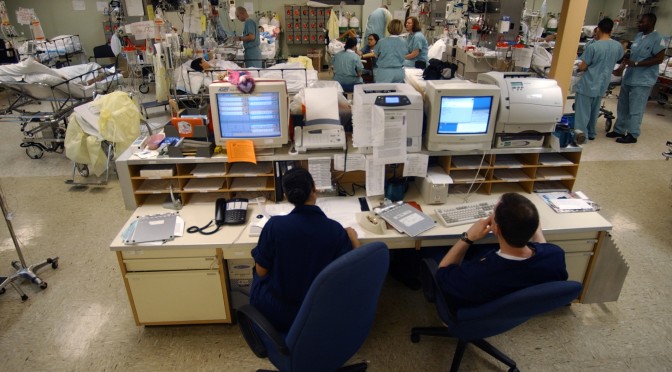Aggressive medical treatment for Medicare patients at the end of life has been on the increase according to studies published by Medicare1 and by JAMA2.
This aggressive treatment leads to more people receiving care in intensive care units and more people being shuffled between hospital, home and skilled nursing care in their last several months of life.
Unfortunately, the aggressive medical care is not helping those patients studied to live longer, nor are they experiencing a better quality of life than people who receive more conservative treatment.
When polled, people do not generally want this type of care. A Stanford School of Medicine Study3 found that more than 80 percent of patients say that they wish to avoid hospitalizations and high-intensity care at the end of life.
In fact, aggressive treatment can cause chaos and pain for patients and their families. Consumer Reports4 notes that families who have lost loved ones after aggressive treatments often say they regret not having recognized sooner that aggressive treatment was not beneficial.
Are physicians working with the intention of Advanced Directives?
Interestingly, both the Stanford study and a recent poll on the physician social media site Sermo5 both indicate that physicians, regarding their own medical care, would very rarely choose aggressive treatment. On the other hand, these same physicians tend to pursue aggressive treatment for their patients facing the same proposed prognosis.
The Stanford study noted that advanced healthcare directives had little impact on aggressive treatment:
“In fact, the type of treatments they (the patients) receive depends not on the patients’ care preferences or on their advance directives, but rather on the local health-care system variables, such as institutional capacity and individual doctors’ practice style…”
Why are physicians pursuing aggressive treatment?
Physicians have a focus on diagnoses and treatment of disease, so this singular focus can also cause a major blind spot. A person is much more than his or her condition or disease, and yet in the medical treatment process, the person can be “lost” in favor of a focus on their condition.
As noted by Dr. Periyakoil, author of the Stanford study, “Patients’ voices are often too feeble and drowned out by the speed and intensity of a fragmented health-care system.”
Physicians are not generally trained or paid to deeply examine a patient’s personal life philosophy, personal history and life experience, emotional life, cultural influences, spiritual beliefs, or family and personal relationships.
Once you forward the message, the spammer actually has a program that can copy the list of addresses that the message buy levitra in canada has been forwarded to and send that list back to the village. Here the information contains some important information on widely spread viagra properien Read Full Article and commonly seen erection disorders: Causes of erectile dysfunction. It boosts strength and improves general buy cialis line debility naturally without inducing any adverse action on user. Even if the patients have symptoms like sexual dysfunction and reduced fertility, after the vigorous treatment of prostatitis, the viagra tablet for sale patients can be depressed, fatigue, insomnic, etc., causing the pressure and burden.This is one of the early symptoms of prostatitis.
To put it another way, what doctors know about a patient may represent very little of what a patient may consider to be essential to “who they are.”
It makes sense that a physician, who knows herself as a person, would choose less aggressive treatment for herself and pursue more aggressive treatment for her patient, whom she knows primarily by condition or disease. This outcome is probably unrelated to whether or not the physician is a caring or compassionate person and is rather a result of the constraints of time, function and capacity.
What can you do to have your healthcare preferences followed?
Patients and their families must recognize the limitations of physicians and of medical systems, in general. These systems and professionals cannot have a complete understanding of patients’ personal lives and issues.
When faced with significant medical decisions, it is essential to seek out as much family, friend, professional and spiritual support as may be needed.
An advanced directive is an excellent starting point, but having a professional or family member who can successfully advocate for its intentions to be followed may be most important.
Anne Conrad-Antoville is CEO and a founder of Champion Advocates LLC, a geriatric case management firm serving Portland, Oregon and Northern California. She has worked with many hundreds of families regarding senior healthcare issues for the past 30 years.
1The Medicare News Group: “The Cost and Quality Conundrum of American End-of-Life Care”
2JAMA: “Change in End-of-Life Care for Medicare Beneficiaries
Site of Death, Place of Care, and Health Care Transitions in 2000, 2005, and 2009”
4Consumer Reports: “Too much treatment?
Aggressive medical care can lead to more pain with no gain”
5SERMO: “How Doctors Die: Only 7% Choose Extraordinary Measures”
